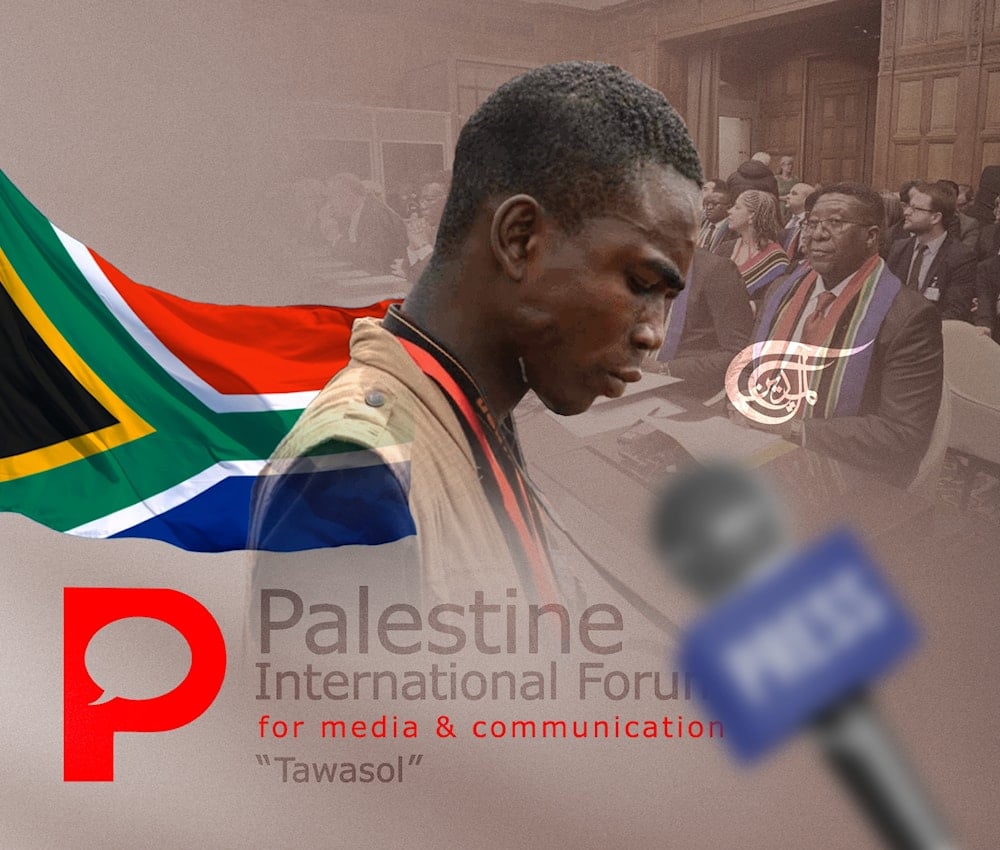Palestine Media Forum training blitz targets southern African journalists
The online training is aimed at dismantling the Zionist contradictory narratives, which often change from one audience to another and from region to region amid a fierce disinformation campaign.
-

“An Introductory Course to the Palestinian Issue for Journalists in Southern Africa… Israeli Colonialism and the Palestinian Struggle: Past, Present, and Future" (Illustrated by Mahdi Rtail for Al Mayadeen English)
As it pursues its mandate to amplify the Palestinian narrative across the globe, the Palestine International Forum for Media and Communication (Tawasol) has started training journalists in southern Africa for a better understanding of the Palestinian cause.
The training, “An Introductory Course to the Palestinian Issue for Journalists in Southern Africa… Israeli Colonialism and the Palestinian Struggle: Past, Present, and Future,” is being run by Tawasol in collaboration with the Embassy of Palestine in Zimbabwe. This first online training has attracted a cohort of 65 journalists from the region.
‘Sharing comprehensive Palestinian narrative’
Deputy ambassador of the State of Palestine in Zimbabwe, Salim Siam, said the purpose of the training is to equip journalists from southern Africa, the region which has always stood firmly on the side of Palestine, with a comprehensive Palestine narrative so that they can report from an informed position.
“This is part of our dialogue and knowledge exchange programme in which we are training journalists from around the world on the Palestinian issue,” Siam said. “In this era of misinformation, it is important to share a comprehensive Palestinian narrative with journalists in this region on what has happened over the 100 years of colonial occupation, first under the British and now under the Zionist occupation.”
The idea to conduct training for journalists in southern Africa emerged at the 4th Palestinian International Media and Communication Forum held in Turkey in January where it was discovered that the region, which shares similar colonial struggles with Palestine, was underrepresented among the over 700-plus journalists that attended this event that run under the theme: “The Palestinian Narrative: A New Era.” The event sought to foster collaboration between Arab and global media to enhance support for the Palestinian cause.
“It emerged at this event that there was a need to engage with more journalists from this region, hence this training,” Palestine Embassy in Zimbabwe media and public relations officer, Munyaradzi Munaro, explained. “We have journalists from Botswana, Namibia, South Africa, Zambia, and Zimbabwe who are participating in the training.”
The online training is being conducted by Dr. Habib Omar from Palestine Media Forum, Turkey, who took his time to dismantle the Zionist contradictory narratives, which often change from one audience to another and from region to region as the regime takes advantage of limited knowledge on the correct narrative. It is these knowledge gaps among journalists that the training is filling.
Habib highlighted that southern Africa, being predominantly Christian, was susceptible to the Israeli propaganda that seeks to mislead them into believing that the current "Zionist state" is a continuation of the biblical religious nation of Israel.
“We need to reach out to those people who support ‘Israel’ out of ignorance shaped by the Zionist propaganda,” he said, highlighting the irony that most of the founders of the "Israeli state" were actually atheists who did not even believe in God.
‘An eye opener’
Peter Tanyanyiwa, a Zimbabwean journalist, one of the dozens who gathered at the Palestine embassy in Harare for the Zoom training, told Al Mayadeen English that the course proved to be an invaluable experience for journalists seeking to deepen their understanding of one of the world’s most enduring and complex struggles.
“The course, which included a special lecture by Dr. Habib, provided a comprehensive historical background, tracing the roots of the Palestinian people, the rise of Zionism, and the subsequent events that have shaped the modern Middle East,” Tanyanyiwa said.
“As a participant, I found the structured approach—covering everything from the Nakba and Israeli wars of expansion to the current political system and major issues facing Palestinians—offered a nuanced perspective that is often missing from mainstream coverage. The course’s interdisciplinary methodology, integrating history, politics, and cultural studies, enabled me to critically analyse the narratives surrounding the conflict and appreciate the depth of Palestinian identity and resistance.”
He added that the training addresses the challenges journalists face when reporting on the "Israel"-Palestine struggle, particularly the prevalence of Western media bias and the importance of presenting balanced, well-researched stories.
Ernest Moloi, a journalist from Botswana who participated in the course, also described it as an "eye-opener".
“It’s powerful, engaging and empowering! It pulls the veil from the eyes,” Moloi told Al Mayadeen English.
“For me debunking the myths that Jews are God’s chosen people using religion was an eye opener, as well as learning about the Yinon Plan, the Zionist plan to expand the undefined borders of ‘Israel’ from the Nile to the Euphrates, which explains why it doesn’t have a Constitution to this day,” he added.
‘Course useful to counter dominant narratives’
Tanyanyiwa said he would recommend the course to other African journalists because it not only enhances reporting skills and cultural sensitivity, but it also fosters a sense of solidarity and shared purpose among journalists from the Global South.
“The course’s emphasis on critical thinking, ethical journalism, and the development of safety networks for reporters in conflict zones is particularly pertinent for those covering contentious issues. By participating in this training, journalists are better equipped to challenge dominant narratives, engage their audiences with informed analysis, and contribute meaningfully to the discourse on Palestine and broader issues of justice and self-determination. The experience has undoubtedly enriched my professional capabilities and broadened my perspective, making it a must-attend for any journalist committed to impactful, responsible reporting.”

 Cyril Zenda
Cyril Zenda
 5 Min Read
5 Min Read









